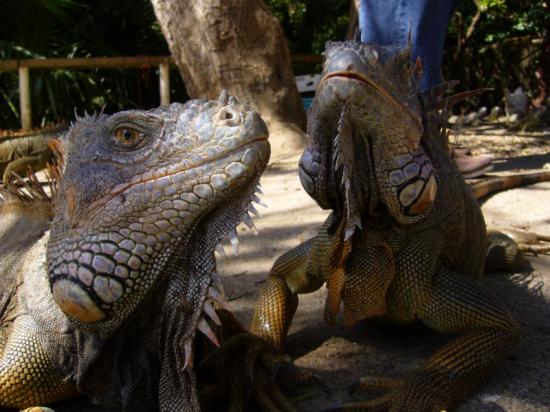根据传统科学思维,与鸟类和哺乳动物相比,蜥蜴的认知能力有限。但一篇刊登在《生物学通讯》(Biology Letters)上的研究报告显示,热带安乐蜥可以解决问题,甚至将习得的能力适用到变化的环境中去。
科学家对6只安乐蜥进行了研究,他们在两个洞中的一个洞里放上蠕虫,让蜥蜴寻找蠕虫的位置。有蠕虫的洞被盖子遮住。
在这6只蜥蜴中,有4只成功通过了这次考验,它们或是用嘴掀起盖子,或是咬穿盖子并将其移除。研究报告合著者利尔和布赖恩·鲍威尔写道:“这完全是一种新形式的捕食行为。”
这些蜥蜴还能够在其他情况下使用这种新习得的开盖策略。当两个洞都被不同的盖子遮住时,这些蜥蜴正确辨认出含有蠕虫的洞,证明它们已经学会辨认遮盖蠕虫的盖子颜色。
两只蜥蜴甚至对新习得的知识进行了调整。当利尔和鲍威尔将蠕虫放入此前一直空着的洞时,所有蜥蜴一开始都找错了洞。
然而,两只蜥蜴发现情况发生了变化,在新的地点发现了蠕虫。
生物学家乔纳森·洛索斯说:“根据环境变化改变行为的能力是动物拥有更高智力的一个标志。

热带蜥蜴与鸟类和哺乳动物的智力水平相当

Behavioural flexibility and problem-solving in a tropical lizard
The role of behavioural flexibility in responding to new or changing environmental challenges is a central theme in cognitiveecology. Studies of behavioural flexibility have focused mostly on mammals and birds because theory predicts that behaviouralflexibility is favoured in species or clades that exploit a diversity of habitats or food sources and/or have complex socialstructure, attributes not associated with ectothermic vertebrates. Here, we present the results of a series of experimentsdesigned to test cognitive abilities across multiple cognitive modules in a tropical arboreal lizard: Anolis evermanni. This lizard shows behavioural flexibility across multiple cognitive tasks, including solving a novel motor task using multiplestrategies and reversal learning, as well as rapid associative learning. This flexibility was unexpected because lizards arecommonly believed to have limited cognitive abilities and highly stereotyped behaviour. Our findings indicate that the cognitiveabilities of A. evermanni are comparable with those of some endothermic species that are recognized to be highly flexible, and strongly suggest a re-thinkingof our understanding of the cognitive abilities of ectothermic tetrapods and of the factors favouring the evolution of behaviouralflexibility.







